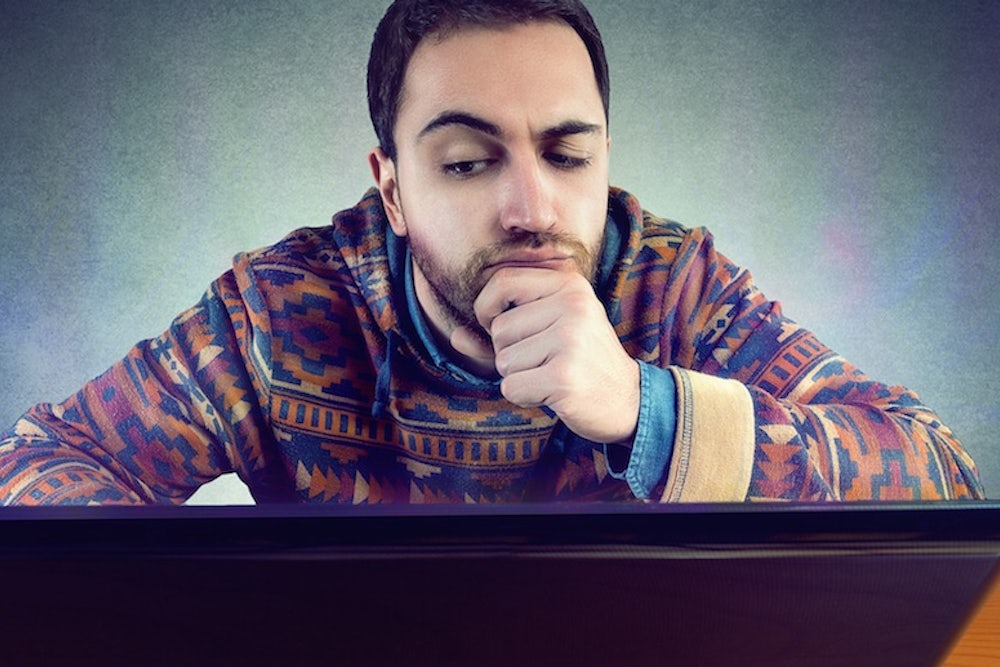Do you complain about your marriage on Facebook? If you’re not, according to Hannah Seligson, you should start. In a recent New York Times piece, Seligson argued that by refusing to broadcast marital spats on social media—by “undersharing about our spouses”—couples are inflicting harm on their unmarried friends. Posting only “the occasional burst of good news” gives a false idea of marriage to your unmarried friends (who evidently don’t have access to movies, novels, or the offline versions of any of their Facebook friends). This creates a vicious cycle: Miserable unions that look blissful online inspire other ill-suited couples to tie the knot.
The predominant complaint on social media used to be against oversharing, from banal complaints about your subway ride to reckless murder accusations. But in the past year or so, the balance has shifted: Whereas we used to question the ethics of sharing, now we question the ethics of withholding. It’s not enough to vent to some offline friends. Anyone who has a private story that might benefit others owes that story to the general public, and whatever is holding someone back from telling all—concerns about reputation, perhaps—starts to look selfish. Social-media silence, once viewed as admirable discretion or a sign that someone’s got too much of a real (that is, offline) life for such trivialities, now seems suspect. Whether it’s that your child has a learning disability or that your wife’s lost interest in sex, the world has a right to know.
That goes for politics, too. While some view partisan status updates as irritating, others see them as a requirement for good citizenship. Here, too, the pro-sharing side is winning out, as became apparent last summer and fall in the debate about why white people weren’t talking about Ferguson on Facebook. In her much-shared essay, Janee Woods argued that her white friends were too busy sharing cat videos and mourning celebrities to remark upon Michael Brown’s death. Woods suggested that the only possible explanation for this silence was apathy or, at least, inadequate concern:
There’s a real fear of saying the wrong thing even if the intention is pure, of being alienated socially and economically from other white people for standing in solidarity with black people, or of putting one’s self in harm’s way, whether the harm be physical or psychological. I’m not saying those aren’t valid fears but I am challenging white people to consider carefully whether failing to speak out or act because of those fears is justified when white silence and inaction mean the oppression and death of black people.
In The Guardian, Heather Barmore acknowledged that white people posting about race are bound to have their privilege checked, but asked them to get over it and post anyway: “[R]acism is real—and the first step to having a practical conversation is to admit that it’s real and that it can be terrifying.” In early December, Vocativ’s Abigail Tracy called out the borough of Staten Island for its “deafening silence” on the Eric Garner grand jury decision, as judged by hashtags on Twitter and Instagram. (The nostalgic “#TBT” evidently won out over “#BlackLivesMatter.”)
A lack of stand-taking on social media can easily be interpreted as callous indifference to the world. It’s now assumed that people not only should but do share everything on social media, so an absence of posts and tweets about certain topics suggests that someone either isn’t thinking about them or is thinking something unspeakable, at least in their social circle.
The fight against parental overshare (a battle I still support) looks like a lost cause. As the very concept of privacy becomes a relic, the notion that people might be selectively open about certain information starts to look quaint. It shouldn’t. A culture of socially-enforced sharing will, I suspect, screw over those with less social-media savvy. They’ll earnestly share all, only to become pariahs among their friends—or nationally, if Gawker picks up the story. And I have yet to see any evidence that the sharing of family members’ secrets makes the world a better place. There are legal reasons divorcing couples should avoid posting too much information; reticence may be less about self-promotion-by-omission and more about a desire not to have posts brought up in court. Those who do post play-by-plays of their marriage’s demise inspire not admiration but bafflement.
There’s a far stronger case to be made for speaking out about current events. While I’d rather not see individuals judged for what they omit from their preferred social media platform, these are effective awareness-raising tools, and a little general social pressure to use them as such doesn’t hurt. Woods and Barmore have a point: If what’s holding you back from calling out injustice is a fear of getting too few likes, perhaps the time has come to accept that status updates are, if not the entirety of political engagement, a start. The same white people who feel queasy if they don’t speak out when someone says something racist at a dinner party would do well to feel the same guilty conscience in their social-media interactions. That doesn’t mean you need to live-tweet your delayed flight, but speak up when the moment warrants it. You might be more severely judged for what you don’t say than what you do.
